Four years ago I spent five minutes not remembering who I was – and then I spent six months worrying that I would never be the same again. When I came to after my crash my helmet was broken and my brain was bleeding internally. Breaking your brain, in an instant or cumulatively over many small bumps, can forever change who you are and how you deal with your reality, and progressively we are learning about the dangers involved with concussions. To date, this has mostly been through research funded by other professional sports, but when parallels were drawn between Dave Mirra and the NFL players who have suffered with Chronic Traumatic Encephalopathy (CTE), it brought the reality of brain injuries squarely to our two wheels with an urgency that would be foolish to ignore.
The problem with the human brain is that it is extremely complicated. If you compound fracture your leg you can look down and using your healthy uninjured brain think ‘well, shit, that’s bad.’ When you bump your head however you may look completely fine – but be completely f*cked. It is also important to note that the brain doesn’t have the pain receptors our limbs have, injuries to it may not be immediately felt as they would with a broken bone. Everything from how many concussions you’ve had previously, to the shape of your skull, damage from drug or alcohol abuse, and the force of the impact itself can all play a role in the level of resulting damage. Even how well you have weathered life’s traumas in the past can dictate how much your brain can withstand.
 | I think it's equally important for us as athletes to be educated on the seriousness of concussions and we need to be smart enough to make the decisions on our own. Granted, that can be hard to do at the times, but you have to just listen to your body, and if your head doesn't feel right then it's time to throw in the towel and take some time off.- Tyler McCaul |
Our frontal lobe is the biggest lobe and also the area most impacted from falls. Here is where we find our conscious thought, voluntary movement, and individual personality characteristics. Damage to this area can impair judgment, attention span, organizational ability, and can cause you to lose motivation. It can also leave you blissfully unaware that there is anything even wrong. The result can be impulsive and rash behavior that is uninhibited and inappropriate, and in the long term patients can experience such things as depression, anxiety, memory loss, and sleep disturbances. Unfortunately, in extreme cases when it is impossible to work or maintain relationships, the sufferer will often turn towards substance dependence in order to cope.
Studies have shown that the biggest improvements relating to recovery happen within the first few weeks post injury, although less rapid improvements have been observed up to three years following. Once a brain is injured however there is no ultimate cure. Any treatments will focus on enhancing remaining skills and honing adaptation strategies to compensate for those that are lacking. And unfortunately, it is the most often affected frontal lobe that is the most difficult and slowest to recover.
Tyler McCaul has experienced his fair share of head injuries over the years. This past season he had an exceptionally bad crash at Rampage and was hospitalized with a pulmonary contusion and bad concussion: “I can definitely attest to how concussions can change you, and although the changes are usually temporary, it’s still a scary thing in the moment.” After the crash, Tyler experienced quick and unexplainable changes in mood that would take him to dark places mentally. He experienced anxiety, confusion and depression, all for no reason apparent to him. Luckily these symptoms have now passed and Tyler feels back to normal but at the time he was embarrassed to talk to anyone about it. He now realizes that it is something people need to be aware of as chances are they or someone they know may one day be dealing with a concussion.
A so-called ‘closed’ head injury often exhibits no outward signs and yet with astounding speed and force, your brain may have just collided with the inside of your skull. And what’s more, impacts taken to the feet or other parts of the body can transmit shockwaves to your brain that cause a concussion without you even having sustained a direct hit to your head. The same goes for impacts to the back of the head resulting in frontal lobe damage because the brain is forced forward and collides with the front of the skull. When Geoff Gulevich fell 45 feet off the Oakley Sender a few years ago he was adamant that he hadn’t hit his head. The medic on site administered a SCAT (Sports Concussion Assessment Tool) based exam anyway, given the shock that had been absorbed through his body on impact. In his case, after two hours of observation, he was cleared to ride. Through that experience though he became aware that head injuries come in all different types of crashes and ‘saves’, and he now believes that “people really don't take concussions seriously enough, and with the research coming out of the NFL, I think we all need to be more aware”.
Just walk it off. This has been every coach’s answer to a non-incapacitating injury for the last century. Really, it wasn’t until a decade ago when Dr. Bennet Omalu discovered CTE – a progressive degenerative disease found in people who have suffered a severe blow to the head - that our thinking began to change. In 2011 both the National Football League (NFL) and the National Hockey League (NHL) changed their Concussion Protocols and developed their own initial testing for all head and neck trauma incidents. The NFL now conducts an evaluation based on the SCAT; a standardized test and focused screening neurological examination that is aimed at excluding cervical spine and intracranial bleeding. There is also an assessment of orientation, immediate and delayed recall, concentration, and a balance evaluation. Much like in other professional sports, doctors in the NFL find themselves in a conflict of interest, not wanting to let down the team or team owner with a diagnosis that would affect play. Due to this an independent neurologist assesses players. In the NHL any player who has sustained head or neck trauma is immediately removed from the ice and placed in a quiet room for a minimum of 15 minutes while they complete testing similar to that followed by the NFL protocol. If they show any signs of concussion they are not allowed to return to play, nor will they be until the can pass future psychological and cerebral tests.
 | I feel education is so important because I wouldn't want someone thinking that head injuries are trivial. There has been a lot of advancement in understanding of head injury risk in the past decade or so and this information takes time to get to the end user - cyclist, soccer player, or their coach, trainer, etc. Or even worse they are basing their understanding on what their old-school coach told them; just tell the player to "walk-off" concussions, don't complain, get back out there and play, and so on. - Brooks Hogya, Event Safety Specialist |
While the steps taken by both the NHL and NFL are impressive and demonstrate the seriousness of such a trauma, perhaps the most progressive of all major sports leagues in this regard is that of Major League Baseball. In 2007, they implemented official sideline tests based on SCAT2 for players and umpires, but they also require that everyone conduct baseline testing following player signing and during spring training. Further, to these baseline measures, there is a 7-day and 15-day disabled list for players with concussions, and the league’s medical director must clear all players who have suffered a concussion before they return to play.
Dr. Rui Avelar, who spent thirteen years as the Team Doctor for the Vancouver Canucks says that it is typical of a sport that is early in its concussion appreciation evolution to not have standardized protocols in place across competitions. A major and important function of a well-designed concussion protocol is that it takes the return to play decision out of the hands of the injured athlete, because as he says “nothing else works.” Not only do professional athletes in our sport already have pressures stemming from career goals, sponsor expectations, cash prizes, and simple pride, to expect the potentially brain injured to make a responsible decision about whether or not to continue in competition is absurd. All aspects of organized mountain biking - events, societies, associations, and clubs - should have a protocol for head injuries in their rulebooks or guidelines. In this way riders would not be wimping out, they would be following the rules.
 | It's easy to worry about a lot of things other than your health when you're a professional athlete in a dangerous sport, especially the fear of losing sponsors due to being injured. Ultimately what it comes down to though is that if you're worried about a sponsor dropping you because you've decided to pull out of an event due to a concussion, then it's time to find a new sponsor anyways. The companies that value their athletes well being on top of anything else are the ones worth partnering with.- Tyler McCaul |
Gregory Clark, MD, CCFP-EM is the Associate Chief for the Department of Emergency Medicine MUHC at Royal Victoria Hospital in Montreal. Once a year he spends a week of his summer traveling with the BC Bike Race as Medical Director. He, along with Safety Director, Brooks Hogya, have developed a concussion protocol for the seven-day stage race using the SCAT3. The entire medical team (approximately nine people on the course and ten at basecamp) is given information on how to use the tool prior to the event. If a rider has a suspected concussion corroborated by a SCAT3 showing a high likelihood, Dr. Clark will administer the exam a second time before pulling them from the race. This extra step is two-fold. One, while everyone on the medical team is competent to administer the exam not everyone has the same amount of training with it, and two, he understands that disqualifying a rider from the remainder of the race is not something to be taken lightly. As he says, “It is a big deal to tell someone who has trained long and hard that their week of racing is over.”
If a rider breaks their helmet but the SCAT3 isn’t indicative of a concussion, the rider must still liaise with Dr. Clark – and replace their helmet before racing the following day. In order to enforce this rule the attending medics will remove the rider’s race plate. The plate, and attached timing chip, is returned when they have been medically cleared. During this step in the protocol the racer will be put through a progressive series of activities to see if they elicit any concussion symptoms. If they do, they will be pulled from the race. If they do not they will be allowed to return to play.
One of the major challenges that we face in implementing concussion protocols is that mountain biking is not a spectator sport. We do not have a contained field of play, and often these injuries happen on unobserved areas of a racecourse. This is a challenge that Tara Mowat, the High-Performance Team Manager for Cycling BC is up against. This year she will be implementing a newly designed concussion protocol for the Cycling BC Team. Riders will be required to complete a baseline SCAT3 exam at the beginning of their season. The completed exam will then be uploaded to a medical database accessible through a phone app to parents, coaches, and other pertinent personnel throughout the year. As we all vary in our abilities with memory at the best of times, Tara feels strongly that having a baseline to compare further SCAT exams too is key to her program. But her biggest challenge remains how to examine racers who don’t admit or don’t think they have concussion symptoms.
At the root of it all, we need to deprogram generations of thinking. We need to stop applauding racers who finish injured and we need to stop cheering “get back on the bike and finish!” to those racers who crash in front of us. When he was younger Tyler McCaul says he took the gamble and competed at an event even after he hit his head in practice. “I used to think that as long as I didn’t have a broken bone I was fine, so I would be stupid not to compete.” Today riding with a concussion is something he doesn’t take lightly. It slows your responses and causes you to be more likely to make another mistake that could lead to further injury. Post Concussion Syndrome causes your brain to lose its ability to auto-regulate and therefore a second injury could result in a more pronounced brain injury or death. It’s more important to look at the bigger pictures, Tyler says, rather that worrying about getting a result that weekend.
 | I feel like a lot of riders do push [themselves] when they really should step back, but it is so hard when we all just want to succeed so badly! I know the majority of 2014 I still had post-concussion symptoms that I ignored. I would wear sunglasses driving home from the park at night and had a headache like 90% of the time - I wasn't being very smart. I feel like having it monitored takes the pressure off; a lot of us are very hard on ourselves.- Brayden Barret-Hay |
In 2013, Brayden Barrett-Hay was competing in his first ever Crankworx at Whistler when he crashed off a drop at the beginning of his run. “The next thing I remembered was four days later in the hospital.” Brayden had a Traumatic Brain Injury (TBI) with six different bleeds in his brain. Luckily for him, the bleeding stopped before doctors had to operate and induce a coma. Terrified he would never be the same, Brayden struggled with a lack of knowledge in the medical system about what he was experiencing and the diagnosis from three different doctors that he should never ride his bike again. A year later Brayden was back on his bike and feeling like his normal self. During a contest that year, however, he hit his head again and withdrew. “At this stage in my riding, if I hit my head and feel weird at all, like uncoordinated on my bike, that’s when I know. I didn’t hit my head that hard, I just had a headache, but I was scared to push my luck.”
Knowledge is the most important tool we have. We don’t have a cookie-cutter sport; there’s no contained playing field and in most cases, no spectators watching our every move. The protocol we adopt will have to be developed to fit our unique challenges. But the more we educate our riders and community as a whole, the more we broaden the reach of our protocol and shrink our playing field. At this point, concussions are an issue that falls in all of our hands. Event organizers have a responsibility to the riders, but so do parents, coaches, sponsors, teammates, and most importantly, so do the riders themselves. In order to have a cohesive protocol in place, it needs to grow from the bottom up, through the riders themselves, and not just from the top down. And perhaps the most necessary message needs to be that the decision to return to play should never be left to the injured rider.
 | What we do is dangerous, but it's fun, so that's ultimately why we do it. You can be as careful as you want when you ride, but shit still happens. It's important though to weigh the risk versus reward factor, and that will usually help you to avoid most injuries before they happen.- Tyler McCaul |
MENTIONS: @Gulevich87 / @dbaker / @TMcCaul / @BCBR / @braydenbarr
Author Info:
Must Read This Week
How to Watch the 2024 Mountain Bike World Cup [Update: Staylive Offering Access in New Zealand, South Africa & More]
60335 views
60335 views
[UPDATED] Final Elite XC Results & Overall Standings from the Mairiporã XC World Cup 2024
41250 views
41250 views
Sign Up for the Pinkbike Newsletter - All the Biggest, Most Interesting Stories in your Inbox
PB Newsletter Signup

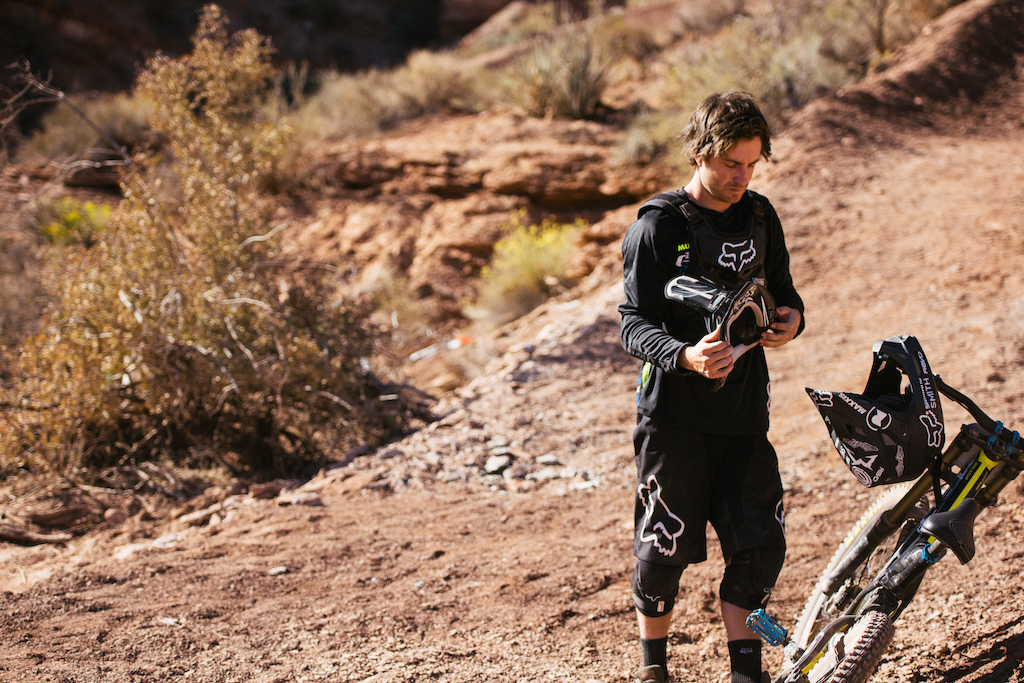
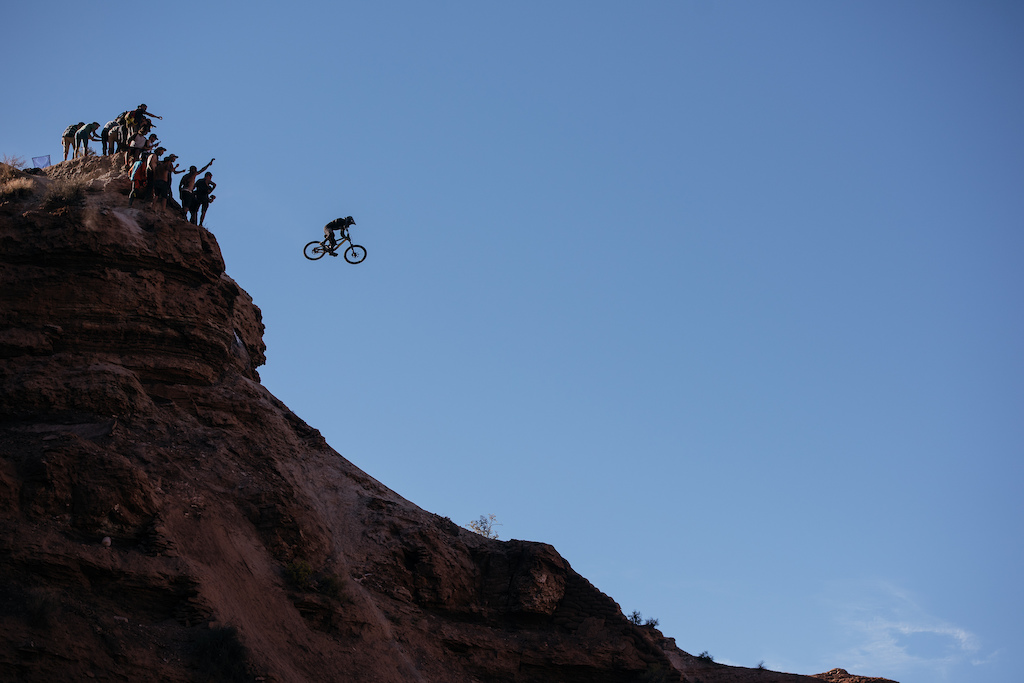
 Tyler's crash on this line last year at Rampage put him in the hospital with a pulmonary contusion and bad concussion. Photo: Paris Gore
Tyler's crash on this line last year at Rampage put him in the hospital with a pulmonary contusion and bad concussion. Photo: Paris Gore 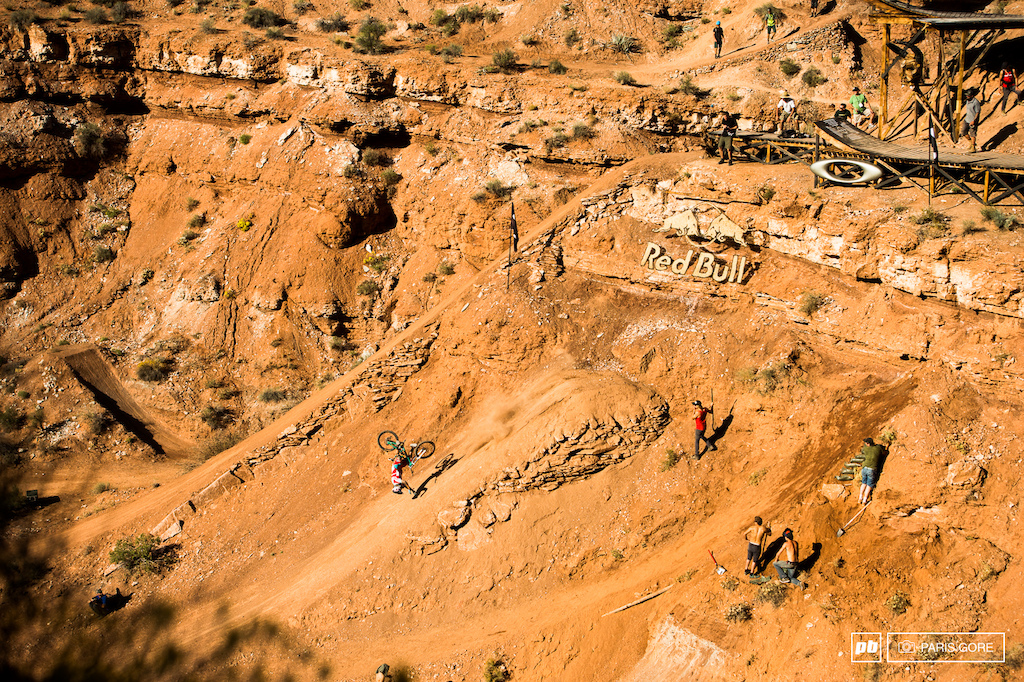
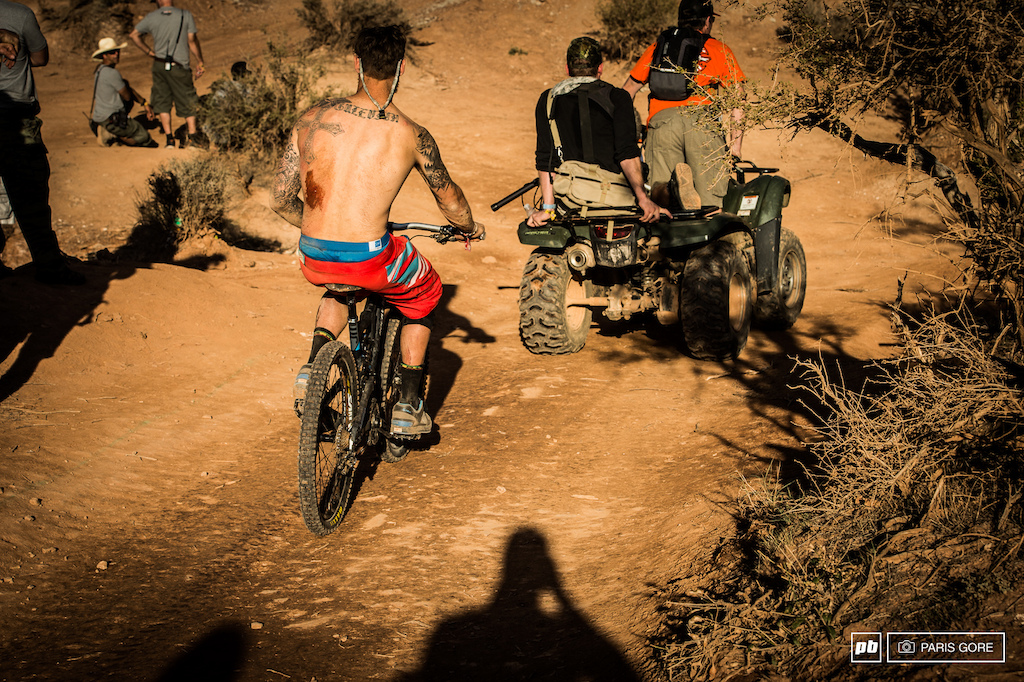


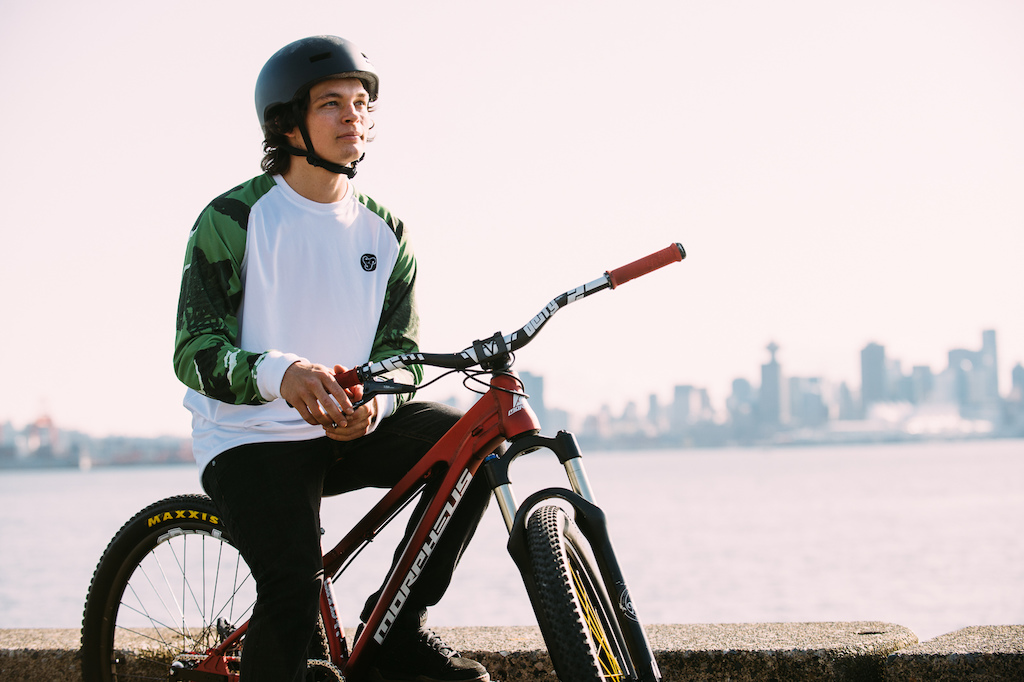
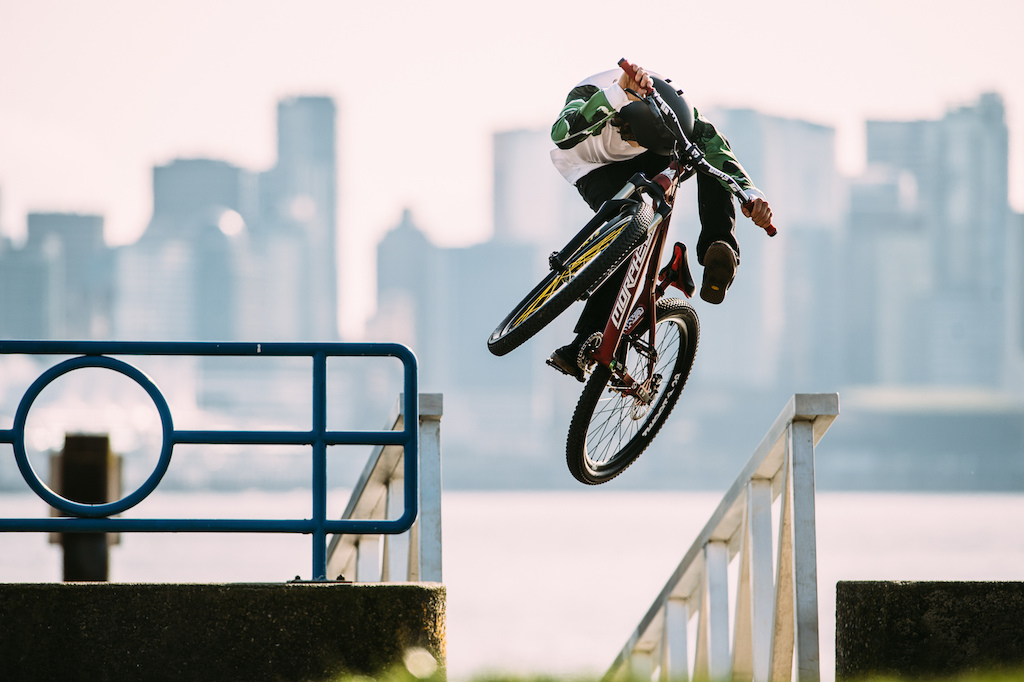
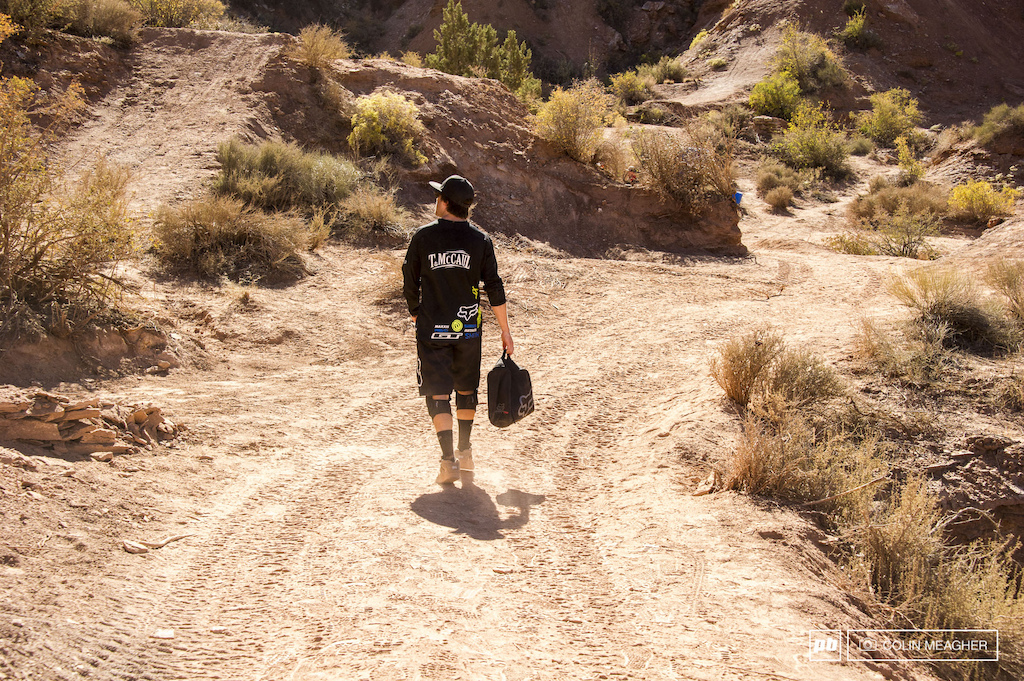

As far as breaking apart, having the helmet break would be a good way to dissipate some energy, but if you were still tumbling, it might not be so awesome
its a common experience, and one that many dirt jumpers and bmx riders have experienced
a typical one is "casing" the landing of a dirt jump - hanging up your back wheel and coming to a very sudden stop; sometimes causing you to fall or go over the bars (if lucky landing running), sometimes just coming to a very abrupt stop
impact travels up the spine and shakes the brain. a nasty head ache can be the result for several hours, or days
I've experienced this myself dirt jumping, and also landing too hard in the skatepark on my bmx - missing a landing and going to 'flat' not crashing but coming down very hard and suffering a big shock through the bike
the nastiest head slam to date was a jogger running into the road without locking whilst I was riding home at night.
I hit him square on, over the bars head first into road, hit my helmet (TSG piss pot) on the road, squashed the liner flat, shell had weird abrasion like a claw mark, cut my eyebrow open.
After picking myself up, got about 2 miles down the road, stopped at train station, getting tunnel vision and my focus zooming back and forth. got to hospital, got checked out, given some drugs to take, felt better 2 days later.
yeah as you mentioned that is the problem. your body is moving at velocity, which includes your brain inside your skull
when you suddenly stop moving, parts of your body experience de-acceleration - often causing a fracture or internal organ damage. because your brain is not fixed inside your skull it also moves.
if you look at what happens in automobile accidents, its the rapid de-acceleration that causes the huge damage even at relatively low speeds, the amount of kinetic energy transferred through the body is immense, even on a bicycle.
when I was younger I experienced being hit by a car when out riding my bicycle on the road, this is when I realised how much energy is involved in a moving motor vehicle
I can only describe it as being "picked up by the hand of god" and literally lifted and thrown about 20 feet forward into thankfully a soft hedgerow. I escaped with a smashed helmet, head ache and abrasions to my palms.
classic hit and run, the driver did not stop. my bicycle had the rear wheel squashed flat against the seat tube with the stays also squashed
fortunately I was riding an old steel Peugot mountain bike - which was a burly bike and probably helped in the impact
unfortunatgely it was my dad's bike, so I owed him a new bike, and he never let me forget that!
He never woke up...
Proves that the general public think that concussions aren't a big deal.
End of story... he's fine, but after reading this I feel ashamed for not having taken that incident more seriously.
I texted my dad about it and he said he would come get him. I ended up skipping class and pulling him out of his myself because he thought he was fine for the day.
Long story short, he got taken to the Doctor and puked a bunch while he was there, so it just confirmed he had one.
He's had a fair few minor ones from random accidents, all of them leading to him heaving later, but this makes me wonder about him some more. I've never been diagnosed with one, but I have hit myself a couple of times with the whole "walk it off" mentality seeming to work for me. But this article definitely makes me reevaluate my choices
The paramedics would always attend these accidents, and would go through a series of questions similar to those mentioned in this article - not as complex as this was a few years back.
The typical rider response would be general confusion and asking the same question over and over again "Where am I"? "Where's my bike?", etc. This would be repeated every 30 seconds.
It's 10 years later and all I can recall of the crash was the loud "ding" as my helmet smashed on the snow. Lights out.
I had to eventually change jobs from being a paramedic and today work as a massage therapist. I see people almost daily that tell me they have post concussion syndrome by telling me their symptoms and none of them are aware they have suffered a head injury. Plain and simply we are not as tough as we think we are and the long term effects are so much more than a field test.
The brain is the Center of most everything in our bodies and when you damage it in any way all kinds of things start to happen. One of those is hormone production, or more important stopping the production of hormones. Specifically testosterone and growth hormone. These stop being produced in a way that literally puts the brakes on your performance. You won't recover from injuries as easily or quickly and you will lose your drive to get out there.. Call it the "fear" call it surgery season whatever but you don't get back on the horse and rebuilding your strength gets harder and harder. Your doctor will tell you, your aging and to get over it or that your thyroid is broken and throw some meds at you but if they test for those hormones dollars to donuts they are low and can be supplemented.
That's all I've got time for right now but check out
Www.tbimedlegal.com
Search dr mark Gordon
There is so much information coming out and no one is putting the story together because the people effected have the concentration of a newt and the docs that treat them were trained 30 years ago. Keep it shiny side up guys!
@erikwyattatmedotcom I had a similar experience. Because of a significant injury I sustained not much attention was given to the possibility of a concussion. It wasn't until I got home and realized I was having memory issues, etc that I started to figure it out.
hmm, scary stuff, you never know what the long term affects can be, and they are hard to measure. Thanks for article.
Firstly, thank you for one of the best pieces of well-researched journalism I have seen here; we should not be surprised since Danielle has been writing content of similar quality for years (thanks Danielle).
More strikingly for me though is the clarity with which it is possible to see how the quality of the journalistic input here has elevated the comments section from its usual vitriolic self into something far more....well, just better.
There are some excellent, pertinent and insightful comments that have added greatly to the article itself; and we should forever be grateful to Danielle for achieving that through her writing.
So, I have a suggestion for you, Why not send Danielle Baker and Vernon Felton to cover the same story once in a while? It would make compelling reading.
I just watched that again earlier...
I'd shit my pants if I was jumping down like 20 feet and missing half my vision. He's lucky muscle memory helped him catch it properly
Take a few minutes
Adrenaline can run high and hide any injuries, so chill out get your heart rate down & assess what is going on.
if you feel weird at all!
Let someone know
If you are riding in a group this is easy, have them follow you down to the car. If you are alone, calling someone you trust who will take you seriously is imperative. You can also use the gps to find out where you are.
Be wary of your pain
Munching on some painkillers can be a really bad idea if you have internal bleeding, a lot of the off the shelf (ibuprophen for example) painkillers thin your blood. This makes it much harder for your body to clot a leak.
Get home safe.
Just chill from here on out, keep the heart rate down, (don't pull wheelies and do bunny hops to check you are allright,) have a mate drive you to the Drs. Shock can kick in quite a bit later after an accident too so, be careful if your on your own, make that phone call.
I hope this helps a bit, I have made all these mistakes in the past, however in my last crash I suffered internal bleeding. I had no pain or symptoms, but I felt wierd. Fell into shock 2 hours later at the hospital. I survived because of the smart people around me, making good objective decisions, I was lucky.
As soon as the stigma attached to calling it quits after a bad knock is removed we'll see a drop in the repeat concussion issues.
I think the MTB community is ahead of the other sports in this regard, but i think at some point the pros have to lead by example, show that theres nothing wrong with sitting a major event out because you suspect a concussion, red bull's profits arent worth the shit repeated head trauma can cause.
Only 3 of my 20+ concussions have come from mountain biking. and when i do mountain bike i usually wear a mouthguard along with a helmet. I now have to wear a padded helmet and mouthguard just to play soccer.
The thing you've got to realise is that so much damage was done by the first one, and then collectively by ongoing concussions that each it is easier each time to get a concussion. I will take all precautions, but i'm not going to become someone who only goes to the gym because everything else is too dangerous for him, I'm 28 years old, i'm not going to not do the few things that keep me sane.
If you have a crash or even just a bad, heavy landing just be aware of any odd behaviours or feelings. Get then checked out.
The 'return to learn' aspect is also very important as folk with concussions at the weekend return to college/school and have huge difficulties with workload/concentrated for a period of time after - the sports side of concussion is well recognised and managed, the educational side of recovery after concussion much less so...
'Return to Learn' is an important part of concussion recovery - crash at the weekend then have issues at school/college with concentration/headaches etc - the sports side of concussion recovery is well recognised and better managed now, but the impact of concussion on schoolwork is less well recognised/appreciated. Folk may need less homework/shorter days for a while after a significant concussion - ask if your school/college has a plan for this - if not they should have!
Interesting to find out that our brain's have no pain receptors. So headaches are our brain creating the sensation without actually being told to by the none existent receptors?
This can happen even with a "normal" concussion, as it may disrupt the olfactory nerves...
Sadly some other sports like Supercross / motocross aren't as tuned into this. Anyone who follows SX knows the controversy on concussions this year. Even the fans have been extremely critical and have misdirected their ignorant lack understanding to harsh judgement and criticism of certain riders. Some of the crap that was spewed on social media was down right disgusting. Theres big money in those teams and the ensuing evil of money shows when they allow and even push their riders to attempt racing when there are clearly some lingering symptoms. When participating in one race can mean 10s or even 100s of thousands of dollars for investors. A riders well being can be pushed aside.
Bottom line Mountain biking has a fantastic community, on both the private side and business side, that shines brighter than many when it comes to rider safety and education. I hope the education keeps pushing and riders keep listening. Because it doesn't have to mean less fun, but more fun for much longer. Take time and heal when you need to.
demand something safer.
Be safe out there. Best rule of thumb... if you ever crash and your head is the first thing to hit, or takes the brunt of the fall, call it a day, spend the rest of the next week catching up on Netflix, let your body rest.
Even if you show no neurological signs or symptoms of a concussion, falling on your head (even with a helmet) from any height isn't doing your brain any favors, and remember, just like the article said- BRAIN DAMAGE IS IRREVERSIBLE- we have a lot of neurons to do go around, but once they are gone, its over.
I have sustained five concussions where I lost consciousness (3 bike related, 2 not) between the ages of 12 and 23. I am now 25. I do not know how many other low grade concussions I suffered over this period of time, but I do know that my personality went through a dramatic shift during my late-teens. This wasn't the normal change that most go through during this time, but a more pronounced, in-your face sort of thing.
Medical professionals focusing on this area of study are finding out with increasing regularity that TBI's (Traumatic Brain Injuries) sustained months or years ago can still have pronounced effects on cognition, hormones and mood. I still find myself susceptible to depression, mood swings and attention deficits and have not sustained a concussion for years.
I urge those of you who have dealt with concussions in the past to do more research on this topic. They are finding that TBI's can have a dramatic impact on hormonal regulation by down regulating the hypothalamus' neural and vascular connections. This can effect testosterone, growth hormone, estrogen and many other key hormones.
I have not got a hormonal test yet, but plan to in the near future. Many medical doctors are not up to date with this information so it is hard to get a sound opinion. One doctor making strides with the military and TBI/PTSD is Dr. Mark Gordon out of California. He has a great deal of information available on his websites: www.millenniumhealthcenters.com/index.html and www.tbimedlegal.com. He has also been featured on the JRE #438, #547 and #700. He talks more about the topic on those episodes. Additional resources can be found here: www.lifeextension.com/magazine/2012/1/Using-Hormones-Heal-Traumatic-Brain-Injuries/Page-01.
I am not advocating that hormonal replacement is the way, as I am not a medical practitioner nor have I gone that route myself. What I do suggest is finding out more information and digging deeper if you have sustained a concussion (losing consciousness or not) and now experience symptoms ranging from depression to loss of libido even if years have gone past.
did you get a concussion test or anything after you stacked?